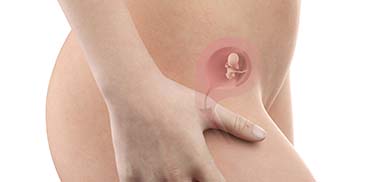About you
Let's look at the first week, where it all begins and why it's as important as any of the others which follow:
In the first week
As exciting as this sounds, the reality of being 1 week pregnant isn t all that wonderful. This is when you will have your period and for now, there isn t even a baby present. This is because it is still a couple of weeks away from being conceived. That doesn t mean that you can just ignore this first week though. You still have some early planning and date keeping to do.
Each time you have a period, your body is preparing itself for a potential pregnancy. A lot of complex hormonal changes are going on in your body, in readiness to support fertilisation if it happens in around a fortnight's time. This is why we count the first day of a woman's period as a starting point for the countdown towards the expected date when the baby is due. Although it may seem to not make sense, including the first 2 weeks is standard practice.
Mark on a calendar the day and date you started bleeding and for how long your period lasts. If you can, keep a record for a couple of months so you know the length of your menstrual cycles. For most women this is around 28 days, though a few days either side of this is still considered within a normal range. Becoming familiar with your own body's rhythms and cycles will help you to plan for conception and the time you are most likely to fall pregnant.
When will I ovulate?
Most women ovulate around 12-14 days after the first day they start bleeding. If you want to fall pregnant, try timing when you have sex to coincide with, or just before your ovulation.
Conception: how and when does it happen?
We can never know exactly when conception or fertilisation occurs. Although the earth may have moved for you both when you had sex, nothing as momentous happens when a sperm and egg meet up. Conception usually happens without fanfare or any outward signs that it has happened.
There is a small window of time around when an egg (ova) can survive after it has been released from the ovary. It takes around 12-24 hours for the egg to migrate from the ovary and down the fallopian tube. This is where fertilisation of an egg with a sperm usually happens. Sperm can generally survive for longer than an egg can, but only the hardiest and most mobile of the sperm can find their way up through cervix and uterus to the fallopian tube.
Lots of books and web sites refer to the last normal menstrual period or LNMP. This is because some women will have a light bleed at the time when the fertilised egg burrows into the lining of their uterus. It's important that this show of blood isn t confused as a period, which is why the word "normal" is used to clarify.
Being 1 week pregnant: what you can do
- Keep a record of when your period starts and how long you bleed for. This will help you to track the length of your cycles and when you are more likely to conceive.
- If you want to conceive, stop using contraception. If you have been using a hormone based contraceptive such as the contraceptive pill, it may take some time for your body to readjust to its normal cycles.
- Start taking pre-natal vitamins which a include folic acid supplement. The recommended dose in early pregnancy is 500 mcg/day and if possible, start taking this a couple of months before you fall pregnant. Low folic acid intake has been linked with a higher incidence of neural tube defects in babies.
- Try to stay healthy and active. Aim to do some exercise each day and eat sensibly.
- Have a medical check-up to make sure you are in the best possible shape to conceive. Being overweight, smoking, taking drugs or generally having an unhealthy lifestyle can all interfere with, or delay conception.
- Make sure your immunisations are up to date. Check with your doctor what you need to have to ensure you are covered and your baby will be protected.
- Try not to take medication unless it has been prescribed for you. Some medications are harmful to the baby, especially in the early weeks of their development.
Hint for the week
Aim for a healthy life. Try to focus on what's good for you and what will help your body stay strong and healthy.
Go to week 2 to find out what happens next!
For more information see Pregnancy or Week by Week.
Yoga videos
Always consult your physician before beginning any exercise program. To reduce the risk of injury, never force or strain yourself during exercise. If you feel pain, stop and seek medical attention if necessary.
If you are in week 1 of your pregnancy...
Your baby's due date: May 25 - June 06, 2022
Baby's star sign: Gemini
Chinese year: Tiger
Famous people born around your baby's birth date:
- Kylie Minogue
- Marilyn Monroe
- Angelina Jolie
Last Published* May, 2024
*Please note that the published date may not be the same as the date that the content was created and that information above may have changed since.





















